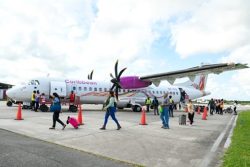UNITED NATIONS, (Reuters) – Haiti’s police will not win a fight against criminal gangs without more international support, including the key deployment of a rapid action force, the United Nations envoy to the impoverished Caribbean country said on Wednesday.
While it has been three months since U.N. Secretary-General Antonio Guterres proposed such a force – after it was requested by Haiti’s government – diplomats say discussions appear to be stuck on which country would take the lead.
The U.N. envoy to Haiti, Helen La Lime, told reporters she was “still hopeful” a rapid action force could be created, adding: “We could act with more urgency; I think the international community needs to.”
“We will not win the fight without significant levels of additional support,” she said. “The only thing that Haitian people are really preoccupied with right now is security, is being able to survive to the end of the day.”
The United States, Canada and Mexico discussed the issue at a leaders’ summit in Mexico City earlier this month. Ahead of the summit, White House national security adviser Jake Sullivan said it was critical to identify a country to take the lead and noted that Canada had expressed an interest in that role.
Canada’s Prime Minister Justin Trudeau said at the summit that Canada was working with allies including the United States to prepare for “options” if the situation in Haiti deteriorates.
A multinational force would not deploy as a U.N. mission, but it would likely receive U.N. Security Council backing. The United States has said it would seek a council resolution, but diplomats said that would only happen once a force was formed.
Haitian gangs have expanded their territory since the 2021 assassination of President Jovenel Moise. The resulting violence has left much of the country off-limits to government and led to routine gun battles with police.
In September, Haitian gangs created a humanitarian crisis by blocking a fuel terminal for nearly six weeks, halting most economic activity.





